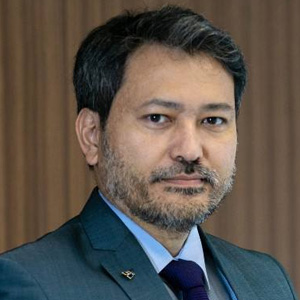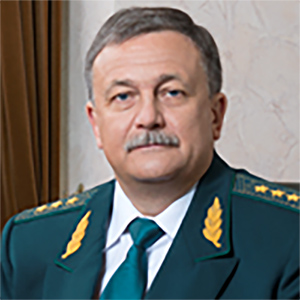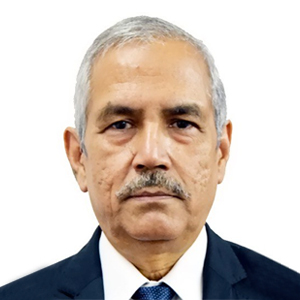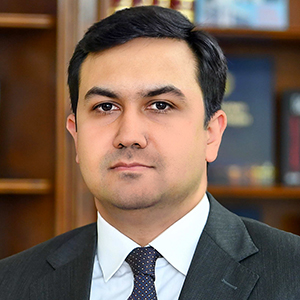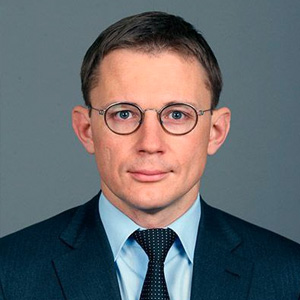
people and technology"
The Federal Tax Service of Russia, together with the Financial University under the Government of the Russian Federation, is holding a two-day forum, which consists of two programs dedicated to the prospects of digitalization and taxation of international trade and the exchange of best practices and innovations in the field of transformation of tax administration.
The Forum will bring together representatives of tax administrations and other authorities of the EAEU, CIS, BRICS, African, Asian, Middle Eastern and Latin American countries, as well as representatives of international organizations, professional and academic experts.
"Tax ecosystem: people and technology"


People Management 2023: Challenges from the Leaders’ Perspective
In the past decade, technology has dramatically changed the way we live. In addition to this, the COVID-19 pandemic and current political and economic environment continue to affect us as human beings.
In their quest for efficiency, leaders have long embraced digitalization, innovative IT solutions, and process automation. Issues for discussion:
- People or technology: which is more important for a leader to focus on
- What are the main HR-challenges your organization faces as digital transformation unfolds
Public sectors leaders, executives and business consultants are invited to participate.

People Management 2023: Challenges from the Leaders’ Perspective
In the past decade, technology has dramatically changed the way we live. In addition to this, the COVID-19 pandemic and current political and economic environment continue to affect us as human beings.
In their quest for efficiency, leaders have long embraced digitalization, innovative IT solutions, and process automation. Issues for discussion:
- People or technology: which is more important for a leader to focus on
- What are the main HR-challenges your organization faces as digital transformation unfolds
Public sectors leaders, executives and business consultants are invited to participate.

Digitalization of Cross-Border Trade: Barriers and Opportunities
Electronic data interchange (EDI) technology can significantly simplify and accelerate international trade by reducing business transaction costs, including time for processing documents and interaction with government authorities.
The exchange of legally binding electronic documents ensures transparency and timely access to data on cross- border trade, which in the future will transform governance and control of international trade decreasing the volume of necessary permits and eliminating reporting for business.
The objectives of the discussion, consisting of two sessions, are to determine trends in development of international EDI and identify barriers and opportunities for digitalization of cross-border trade in the EAEU and CIS.
Heads and experts of tax administrations and governmental agencies responsible for the digitalization and development of EDI in the EAEU and CIS countries, representatives of international organizations, as well as professional and academic experts of the EAEU and CIS countries are invited to participate.
Simultaneous interpretation in English will be available throughout the meeting.

Digitalization of Cross-Border Trade: Barriers and Opportunities
Electronic data interchange (EDI) technology can significantly simplify and accelerate international trade by reducing business transaction costs, including time for processing documents and interaction with government authorities.
The exchange of legally binding electronic documents ensures transparency and timely access to data on cross- border trade, which in the future will transform governance and control of international trade decreasing the volume of necessary permits and eliminating reporting for business.
The objectives of the discussion, consisting of two sessions, are to determine trends in development of international EDI and identify barriers and opportunities for digitalization of cross-border trade in the EAEU and CIS.
Heads and experts of tax administrations and governmental agencies responsible for the digitalization and development of EDI in the EAEU and CIS countries, representatives of international organizations, as well as professional and academic experts of the EAEU and CIS countries are invited to participate.
Simultaneous interpretation in English will be available throughout the meeting.
Panel Discussion. Digitalisation of international Trade: Barriers and Opportunities
- Cross-border EDI: growth points and main drivers
- Experience and trends of international integration and cooperation in the field of cross-border EDI
Panel Discussion. Electronic Document Interchange for Cross-Border Transactions: Practical Perspective
- Legal, technological and organizational barriers to the development of cross-border EDI
- Directions and ways to overcome barriers to the development of cross-border EDI
- Experience of other countries in overcoming such barriers
- Pilot Projects and Industrial Application of Cross-Border EDI

Digital Transformation of Tax Administration: the Role of a Client-Centric Approach
The discussion is devoted to the development of client-centric products and services in digital tax administration.
The focus of our discussion is on the latest tools and practices aimed at delivering better services to taxpayers, building trust by adapting approaches to support taxpayers through their lifecycle, and proactively informing them about their tax obligations and benefits.
We invite representatives from foreign tax administrations, Russian governmental agencies and leading experts in organizational development to join us in this discussion.
Simultaneous interpretation in English will be available throughout the meeting.
Questions for consideration:
- What are the main features of the client-centric governance and tax administration? Do public servants have to be client-centric?
- How can we ensure that interactions with taxpayers are clear, convenient and comfortable, while taking into consideration their life situations and individual needs?
- How can we enhance our approaches to digital product and services? Why is it important to study people’s needs in this context?
- Why is it essential to develop feedback system? Should public servants consider putting themselves in taxpayers’ shoes while preparing responses to queries? What potential outcomes can be expected from this approach?
- Buisness perspective: what is important to know about the customers and whether personalized customer experience does matter?
- What principles and values are foundational to implementing a client-centric approach in tax administrations?
- Can a tax officer also be considered a customer of the tax administration? How does this concept relate to the overall interaction with taxpayers?

Digital Transformation of Tax Administration: the Role of a Client-Centric Approach
The discussion is devoted to the development of client-centric products and services in digital tax administration.
The focus of our discussion is on the latest tools and practices aimed at delivering better services to taxpayers, building trust by adapting approaches to support taxpayers through their lifecycle, and proactively informing them about their tax obligations and benefits.
We invite representatives from foreign tax administrations, Russian governmental agencies and leading experts in organizational development to join us in this discussion.
Simultaneous interpretation in English will be available throughout the meeting.
Questions for consideration:
- What are the main features of the client-centric governance and tax administration? Do public servants have to be client-centric?
- How can we ensure that interactions with taxpayers are clear, convenient and comfortable, while taking into consideration their life situations and individual needs?
- How can we enhance our approaches to digital product and services? Why is it important to study people’s needs in this context?
- Why is it essential to develop feedback system? Should public servants consider putting themselves in taxpayers’ shoes while preparing responses to queries? What potential outcomes can be expected from this approach?
- Buisness perspective: what is important to know about the customers and whether personalized customer experience does matter?
- What principles and values are foundational to implementing a client-centric approach in tax administrations?
- Can a tax officer also be considered a customer of the tax administration? How does this concept relate to the overall interaction with taxpayers?

Joint seminar of the FTS of Russia and the Financial Research Institute under the Ministry of Finance of the Russian Federation “Taxation of Digital Companies and Digital Business Models”
The seminar will consider the current practice and prospects for the development of direct and indirect taxation of digital companies and business models in developing economies, including in the light of the global tax reform BEPS 2.0.
Representatives of foreign tax administrations and ministries of finance, as well as professional and academic experts are invited to participate.
Questions for consideration:
- Digital companies and digital business models: what is in the scope and where is the created value
- Tax administration issues of taxing digital companies and digital business models
- Current and future tax policy trends on the taxation of the digital economy and the global tax reform BEPS 2.0

Joint seminar of the FTS of Russia and the Financial Research Institute under the Ministry of Finance of the Russian Federation “Taxation of Digital Companies and Digital Business Models”
The seminar will consider the current practice and prospects for the development of direct and indirect taxation of digital companies and business models in developing economies, including in the light of the global tax reform BEPS 2.0.
Representatives of foreign tax administrations and ministries of finance, as well as professional and academic experts are invited to participate.
Questions for consideration:
- Digital companies and digital business models: what is in the scope and where is the created value
- Tax administration issues of taxing digital companies and digital business models
- Current and future tax policy trends on the taxation of the digital economy and the global tax reform BEPS 2.0

Cross-Border Transactions: Tax Agency’s Approach
The event is aimed at exchanging experience in the audit of cross-border transactions applying international tax rules and concepts.
Representatives of tax administrations of the EAEU and CIS countries, as well as leading Russian experts in the field of international taxation are invited to participate.

Cross-Border Transactions: Tax Agency’s Approach
The event is aimed at exchanging experience in the audit of cross-border transactions applying international tax rules and concepts.
Representatives of tax administrations of the EAEU and CIS countries, as well as leading Russian experts in the field of international taxation are invited to participate.
Session 1. Pre-Audit Analysis for Cross-Border Transactions
- Is the pre-audit analysis for cross-border transactions essential for the tax authority?
- What does the pre-audit analysis for cross-border transactions consist of, why is it important to carefully read the Double Tax Treaties?
- Scope of pre-audit analysis for cross-border transactions: what can and cannot be identified
- Role of the taxpayers in the course of pre-audit analysis: why it matters
Session 2. Cross-Border Intra-Group Financing: Balance between Debt and Equity Funding
- Are the thin capitalization/interest deduction limitation rules sufficient?
- Determination of whether intra-group financing should be regarded as a loan for tax purposes: what are the criteria
Session 3. Taxation of Cross-Border Royalties
- Reading, interpreting and understanding of article «Royalties» of the OECD Tax Model Convention
- When royalty expenses are tax deductible
Session 4. Concept of Beneficial Ownership
- Is anything needed to be changed in approach to the beneficial owner test for withholding income tax purposes?
- Relevance of “Beneficial Owner of the Income” Concept: current and future trends

Workshop for tax officials. Human Capacity Building and HR Tools’ Implementation
The discussion is devoted to the issues of strengthening human resources and the implementation of modern HR technologies in the public service.
The event is planned as part of the first full-time module of the Knowledge Sharing Program on HR in tax administrations of the EAEU and CIS countries.
HR specialists of tax administrations and governmental agencies of the EAEU and CIS countries, as well as leading HR experts are invited to participate.

Workshop for tax officials. Human Capacity Building and HR Tools’ Implementation
The discussion is devoted to the issues of strengthening human resources and the implementation of modern HR technologies in the public service.
The event is planned as part of the first full-time module of the Knowledge Sharing Program on HR in tax administrations of the EAEU and CIS countries.
HR specialists of tax administrations and governmental agencies of the EAEU and CIS countries, as well as leading HR experts are invited to participate.
Session 1. Modern GovHR
- Rationale for enhancing HR function
- Transformation of the HR function in the public service and its specifics
- Application of the modern HR technologies and trends in working with personnel
- HR Maturity Diagnostics
Session 2. HR Practices in Public Service
- Making HR events effective
- Assessing employees’ loyalty and engagement
Session 3. Recruitment in Public Service
- HR Management policy in public service
- “Government Team” Project: Federal agencies recruiting
Session 4. External recruitment
- How to reduce costs on HR assessment and recruitment with HR contests
Session 5. Recruitment and Employees’ Development
- HR-analytics
- Modern methods of HR assessment and recruitment


